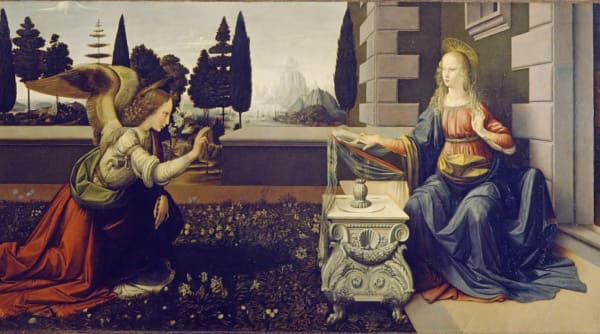“Man of the worldly mind, do you believe in me or not?” – bellows the ghost of Jacob Marley who comes from beyond the grave to offer Ebenezer Scrooge a chance to avoid the damnation which awaits him at life’s end.
Scrooge wavers between belief and doubt, terror and apathy, as he encounters this spirit from his past now calling him to repentance. Scrooge uses the self-protective veneer of disbelief to gain the upper hand. “You may be,” Scrooge taunts the ghost, “an undigested bit of beef, a blot of mustard, a crumb of cheese. . . .There’s more of gravy than of grave about you, whatever you are.”
But Scrooge is wrong, dead wrong, and is brought to his knees by the violence of Jacob’s reaction. Hell is real, and Scrooge is headed there. Jacob knows this and has come to offer Scrooge hope to save his soul. But the path to this redemption must begin with belief. Scrooge must believe this ghost has come from the grave to recall his friend to a better life before all is lost.
Belief. An intangible yet irreplaceable disposition of the heart.
Belief is the bedrock upon which our souls find the footing to become our fullest selves.
There is an interesting dichotomy in the declaration of belief. We can believe that someone exists. Then, going further, we can believe in the true being of that someone. Take the Lord, for instance. I can believe that God exists. And, in fact, I do. But this belief is a thousand times removed from the deeper disposition of faith that internalizes the reality that the Lord loves me profoundly and acts always and only, with omnipotence and with unfathomable love toward me, no matter what the circumstances.
If I am in the boat with Simon, and the storm ensues, I cry out, “Save us, Lord, we are sinking!” (Matthew 8:25) We see the waves, know the odds, and feel the fear that rational analysis conjures in our human heart. Simon’s sinking boat is a daily, if not hourly, occurrence in our lives. The storm upon the waters buffets our boldest acts of faith.
But Christ Himself is in my boat. He holds my life, in its every detail, in His hands. Why then awaken Him in the stern to tell Him of the storm? Surely, He knows. Surely He knows, for He is there. And, more difficult for my wavering heart to assert, surely He cares.
To believe, truly believe in the Lord, means that I believe everything that He allows is not only permitted by Him, but known and seen and offered as His very best love for me, always. And this belief requires absolute confidence, a total trust that He is both all-powerful and all-loving.
When we are told, by even one person, even once in our lives, “I believe in you,” we receive an interior fire, a flame within, urging us to be and become ever more what another has seen in us. The strength of these four words is life-changing, vocation fulfilling, and self-defining. When we believe in people, one more time, it may be the decisive moment of their lives.
Winston Churchill’s doctor, Lord Moran, author of The Anatomy of Courage, observed troop morale in the trenches of World War I. What kept men alive in the most grueling of conditions, he discovered, was the intangible strength they gained when someone believed in them. And just as with people, when we declare our steadfast, unwavering faith in the Lord, He responds to our belief by fulfilling His promises to us.
Our Lady knows this power of belief. She hears the message of the Angel, and replies, in her profound confidence in God, “Be it done unto me according to Thy word,” (Luke 1:38) I believe in You, she tells the Lord, and in all You have foretold, in Your power to bring it about, and in the trustworthiness of Your promise. “Blessed are you,” Elizabeth soon declares, “because you believed that Our Lord’s promises would be fulfilled in you.” (Luke 1:45)
Because you believed.
The Virgin gazes lovingly at St. Joseph knocking fruitlessly on Bethlehem’s doors, searching for relief. Her look says, “I believe in you, and I believe in the Lord who loves us profoundly,” and it strengthens him to try again. Her faithful spousal love provides a secure shelter, and then the Lord provides the Cave of the Nativity, His intended sanctuary for the hidden miracle of His awesome coming into the world.
To believe in another is the highest expression of love that we can offer. It is love full of trust, and trust empowers souls to act. The Lord will test us to our limits, as with Abraham upon Mount Moriah, or Simeon at the Temple, or Christ Himself upon the Cross. With them we cast our nets to the other side, once more, and the haul cannot be contained.
“Faith,” Scripture tells us, “is confidence of what we hope for, the evidence of things unseen.” (Hebrews 11:1) Just so, little St. Thérèse in her loving trust assures us that “We can never have too much confidence in our God. . . .As we hope in Him so shall we receive.” (Story of a Soul)
Believe in the Lord. Allow Him to believe in you. Walk with Peter on the waves and wait with Mary for the fulfillment of the promise. God is always and everywhere full of love, and mighty to act. He commands the wind and the waves; He creates the land, sea, and sky; He can and will always act with love on our behalf. Offer Him your unbounded confidence, trusting in His work, and tell Him, at every moment, that you believe in Him.
Art for this post: Leonardo da Vinci, Public domain, via Wikimedia Commons




